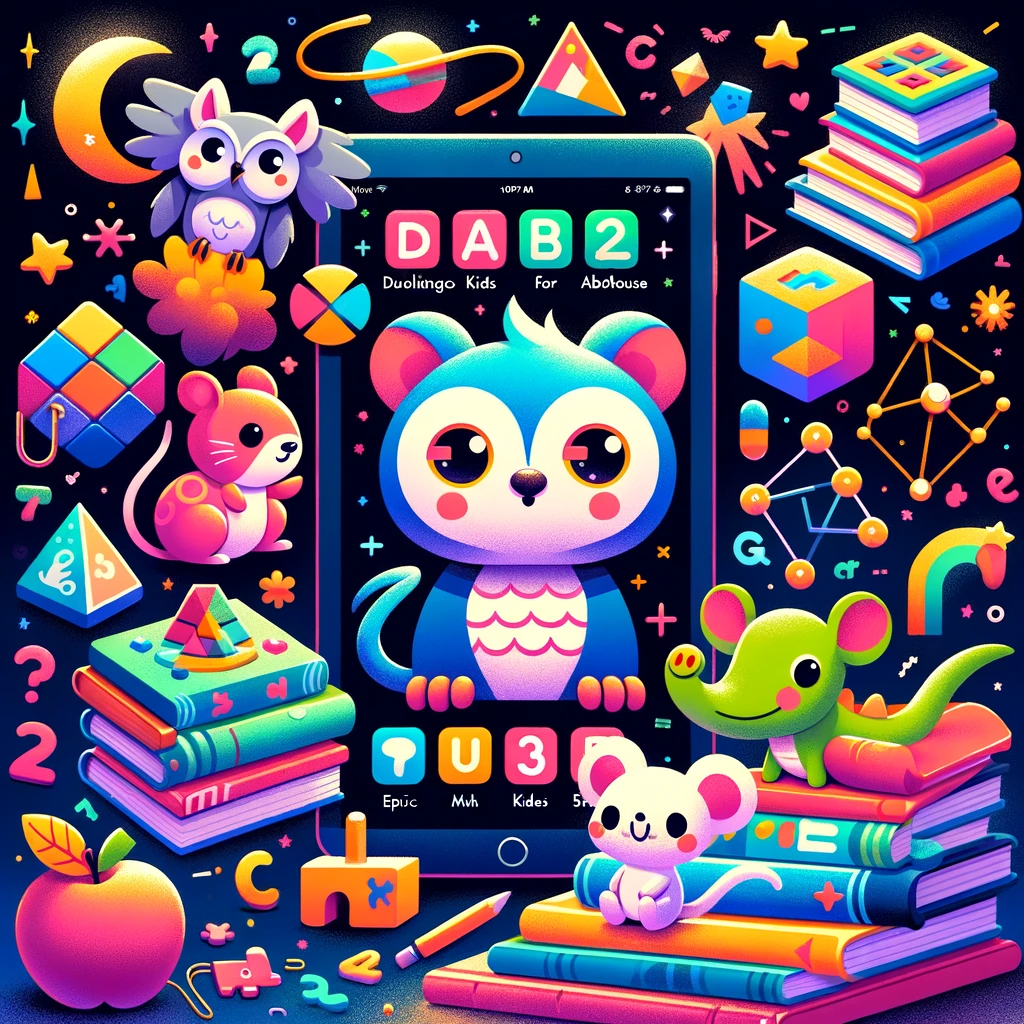In the digital age, finding the right apps for your children can be a game-changer in balancing entertainment and education. Here are some of the best apps that cater to various interests and learning stages:
Language Learning
Duolingo for Kids: Language learning made fun! Duolingo offers a kid-friendly interface that makes learning a new language engaging and interactive. It uses fun characters and rewards to keep kids engaged while they learn a new language. The lessons are bite-sized, making it easy for kids to progress at their own pace. Additional features include:
- Multiple Languages: Offers lessons in a variety of languages including Spanish, French, German, and more.
- Gamification: Uses a points and reward system to motivate continuous learning.
- Interactive Exercises: Includes speaking, listening, and reading exercises to build comprehensive language skills.
Early Learning
ABCmouse: Ideal for ages 2-8, this app covers a range of subjects from reading to math, with colorful animations and engaging activities. ABCmouse uses a step-by-step learning path that allows children to progress through educational activities and games. It’s praised for its ability to hold a child’s attention while providing valuable learning experiences. Key features:
- Comprehensive Curriculum: Covers subjects such as reading, math, science, and art.
- Interactive Games and Quizzes: Keeps learning fun and engaging.
- Progress Tracking: Allows parents to monitor their child’s progress through detailed reports.
Mathematics
DragonBox Series: These apps turn math concepts into fun and engaging games that make learning less intimidating and more enjoyable. They cover various topics from basic arithmetic to algebra, all through games that cleverly disguise learning as play. This makes complex concepts more approachable and less daunting for children. Highlights include:
- Conceptual Learning: Focuses on understanding rather than rote memorization.
- Engaging Puzzles: Uses game mechanics to teach math concepts in an interactive way.
- Multiple Levels: Adapts to different learning paces and skill levels.
Quick Math Jr.: Perfect for young math learners, this app offers a range of math games that adjust to your child’s skill level, making math practice enjoyable and effective. Features include:
- Adaptive Learning: Adjusts difficulty based on the child’s performance.
- Customizable Avatars: Lets kids create their own avatars, adding a personal touch to learning.
- Fun Games: Includes various mini-games that cover fundamental math skills like addition, subtraction, multiplication, and division.
Creative Play
Toca Boca Series: A suite of apps designed for creative play. From Toca Kitchen to Toca Nature, these apps encourage imagination and exploration. Toca Boca’s apps are all about open-ended play. There are no high scores, time limits, or strict rules. Instead, children are encouraged to explore, experiment, and let their imaginations run wild. This fosters creativity and problem-solving skills. Key apps include:
- Toca Kitchen: Kids can cook and experiment with different ingredients.
- Toca Life: A series of apps that let kids create their own stories and adventures in various settings like a city, hospital, or vacation spot.
- Toca Nature: Allows children to create and explore their own natural worlds.
Artie’s Magic Pencil: An app that combines drawing and problem-solving, encouraging creativity in kids. Children help Artie save his world by drawing shapes that turn into useful tools, combining art and storytelling in a delightful way. Features include:
- Interactive Story: Engages children with a narrative while teaching them drawing skills.
- Problem-Solving: Encourages critical thinking as kids draw solutions to challenges.
- Creative Expression: Fosters creativity through drawing and imaginative play.
Literacy and Vocabulary
Endless Alphabet: This app makes learning the alphabet and vocabulary fun with cute animations and interactive puzzles. Each word features an interactive puzzle with talking letters and a short animation illustrating the definition. It’s excellent for expanding vocabulary and understanding phonics. Highlights include:
- Interactive Puzzles: Makes learning new words engaging and fun.
- Cute Animations: Keeps children entertained while they learn.
- Phonics Focus: Helps kids understand the sounds that letters make.
Epic! – Kids’ Books and Videos: Often described as a Netflix for children’s books, Epic! offers an extensive library of books, videos, and audiobooks. It caters to a wide age range and includes educational material, making it a great resource for reading and learning. Features include:
- Extensive Library: Access to thousands of books and educational videos.
- Personalized Recommendations: Suggests books based on the child’s reading level and interests.
- Offline Access: Allows books to be downloaded and read offline.
Science and Exploration
Star Walk Kids: For the budding astronomer, this app introduces children to the wonders of the night sky in a simple and interactive way. It’s an interactive star map that helps kids learn about constellations, planets, and more. The narration is child-friendly and the graphics are engaging, making it a great way to learn about the universe. Key features:
- Interactive Star Map: Allows kids to explore the night sky and learn about celestial bodies.
- Educational Content: Provides facts and information about stars, planets, and constellations.
- User-Friendly Interface: Designed to be easy for children to navigate.
Coding and Technology
Coding Safari: Introduces basic coding concepts through fun and engaging games, suitable for young children. It uses puzzles and challenges to teach kids the logic and sequencing skills that are fundamental to coding. Highlights include:
- Interactive Puzzles: Makes learning coding concepts engaging and fun.
- Progressive Difficulty: Introduces new challenges as the child progresses.
- Foundational Skills: Teaches the basics of coding in an accessible way.
Balance and Real-World Interaction
While apps can be great educational tools, balancing screen time with real-world experiences is crucial. Encourage activities that involve physical movement, social interaction, and hands-on learning to complement digital education.
Conclusion
These apps cater to a variety of interests and learning stages, from language acquisition and early literacy to math skills and creative play. They offer a blend of education and entertainment, helping children develop essential skills while having fun. By integrating these apps into their daily routines, parents can ensure their children have access to valuable educational resources while maintaining a healthy balance of screen time and real-world activities.

